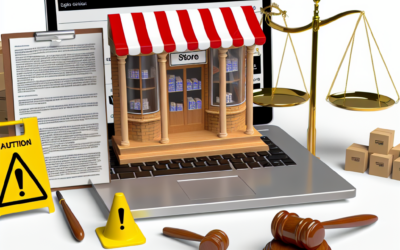GDPR Compliance for E-commerce: What You Need to Know
In the digital age, e-commerce businesses are thriving, but with great power comes great responsibility. The General Data Protection Regulation (GDPR) is a critical piece of legislation that e-commerce businesses must adhere to when handling personal data of EU citizens. This article delves into the essentials of GDPR compliance for e-commerce, offering insights, examples, and practical steps to ensure your business stays on the right side of the law.
Understanding GDPR: A Brief Overview
The GDPR, implemented in May 2018, is a comprehensive data protection regulation that aims to give EU citizens more control over their personal data. It applies to any business, regardless of location, that processes the personal data of EU residents. Non-compliance can result in hefty fines, making it crucial for e-commerce businesses to understand and implement GDPR requirements.
Key GDPR Requirements for E-commerce
To ensure compliance, e-commerce businesses must focus on several key areas:
- Data Collection and Processing: Businesses must collect and process personal data lawfully, transparently, and for a specific purpose.
- Consent: Obtain explicit consent from users before collecting their data. Consent must be clear, informed, and freely given.
- Data Subject Rights: Respect the rights of data subjects, including the right to access, rectify, and erase their data.
- Data Protection Officer (DPO): Appoint a DPO if your core activities involve large-scale processing of sensitive data.
- Data Breach Notification: Notify authorities and affected individuals within 72 hours of a data breach.
Practical Steps for GDPR Compliance
Implementing GDPR compliance can seem daunting, but breaking it down into manageable steps can help:
- Conduct a Data Audit: Identify what personal data you collect, how it’s processed, and where it’s stored.
- Update Privacy Policies: Ensure your privacy policy is transparent and easily accessible, detailing how you handle personal data.
- Implement Data Security Measures: Use encryption, secure servers, and regular security audits to protect personal data.
- Train Employees: Educate your team about GDPR requirements and the importance of data protection.
- Review Third-party Contracts: Ensure that any third-party service providers are also GDPR compliant.
Case Study: A Lesson in Compliance
Consider the case of British Airways, which faced a £20 million fine in 2020 for failing to protect customer data. A cyberattack exposed the personal data of over 400,000 customers, highlighting the importance of robust data security measures and timely breach notifications. This case serves as a stark reminder of the potential consequences of non-compliance.
The Benefits of GDPR Compliance
While GDPR compliance may seem burdensome, it offers several benefits:
- Enhanced Customer Trust: Demonstrating a commitment to data protection can build trust and loyalty among customers.
- Improved Data Management: Streamlining data processes can lead to more efficient operations.
- Competitive Advantage: Being GDPR compliant can differentiate your business in a crowded market.
Conclusion: Navigating GDPR Compliance
GDPR compliance is not just a legal obligation but an opportunity to enhance your e-commerce business’s reputation and operations. By understanding the key requirements, implementing practical steps, and learning from real-world examples, you can navigate the complexities of GDPR with confidence. As the digital landscape continues to evolve, staying informed and proactive about data protection will be crucial for long-term success.
In conclusion, embracing GDPR compliance is a strategic move that can safeguard your business and foster trust with your customers. As you implement these practices, consider how they can be integrated into your broader business strategy to drive growth and innovation.









